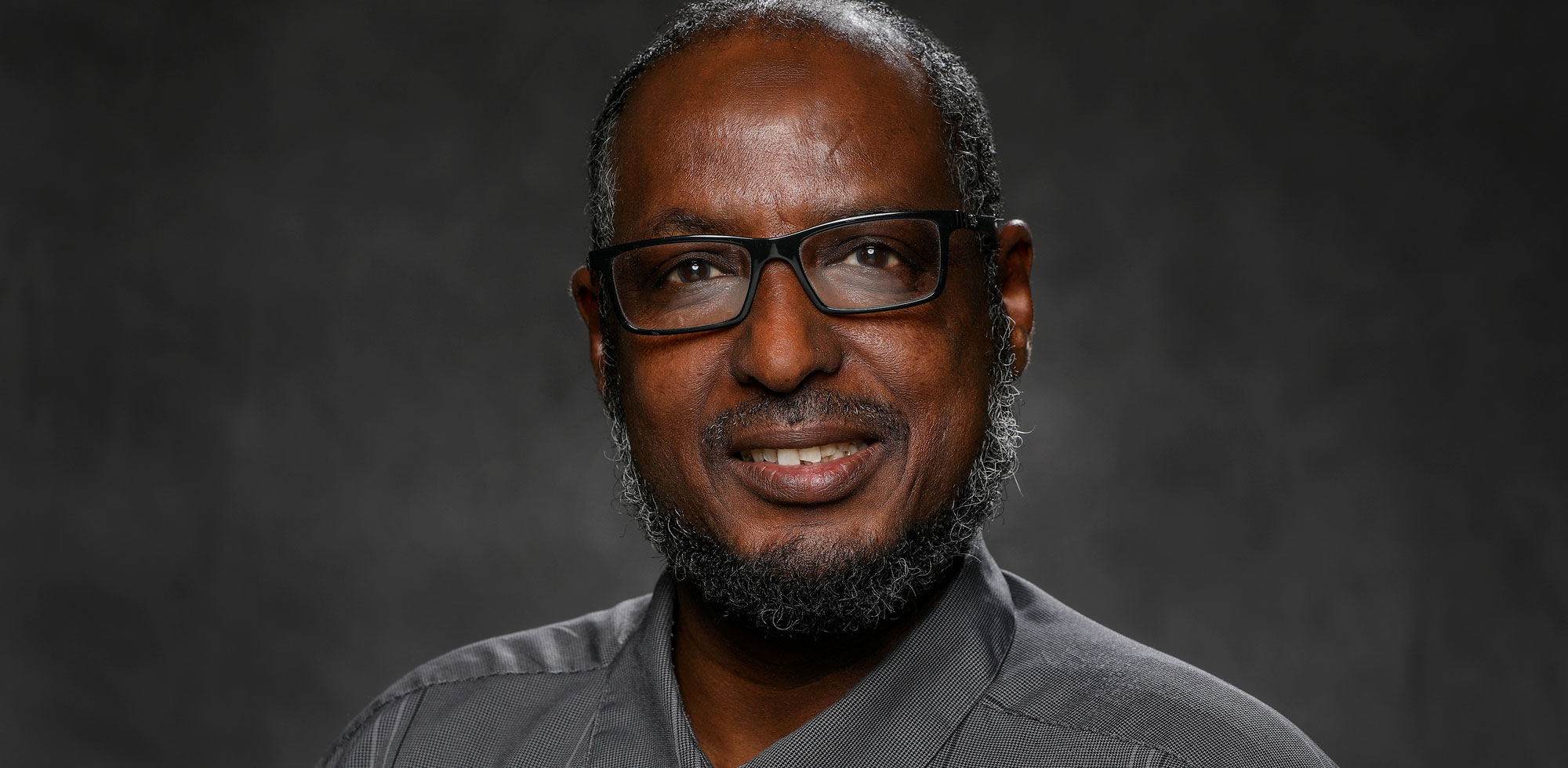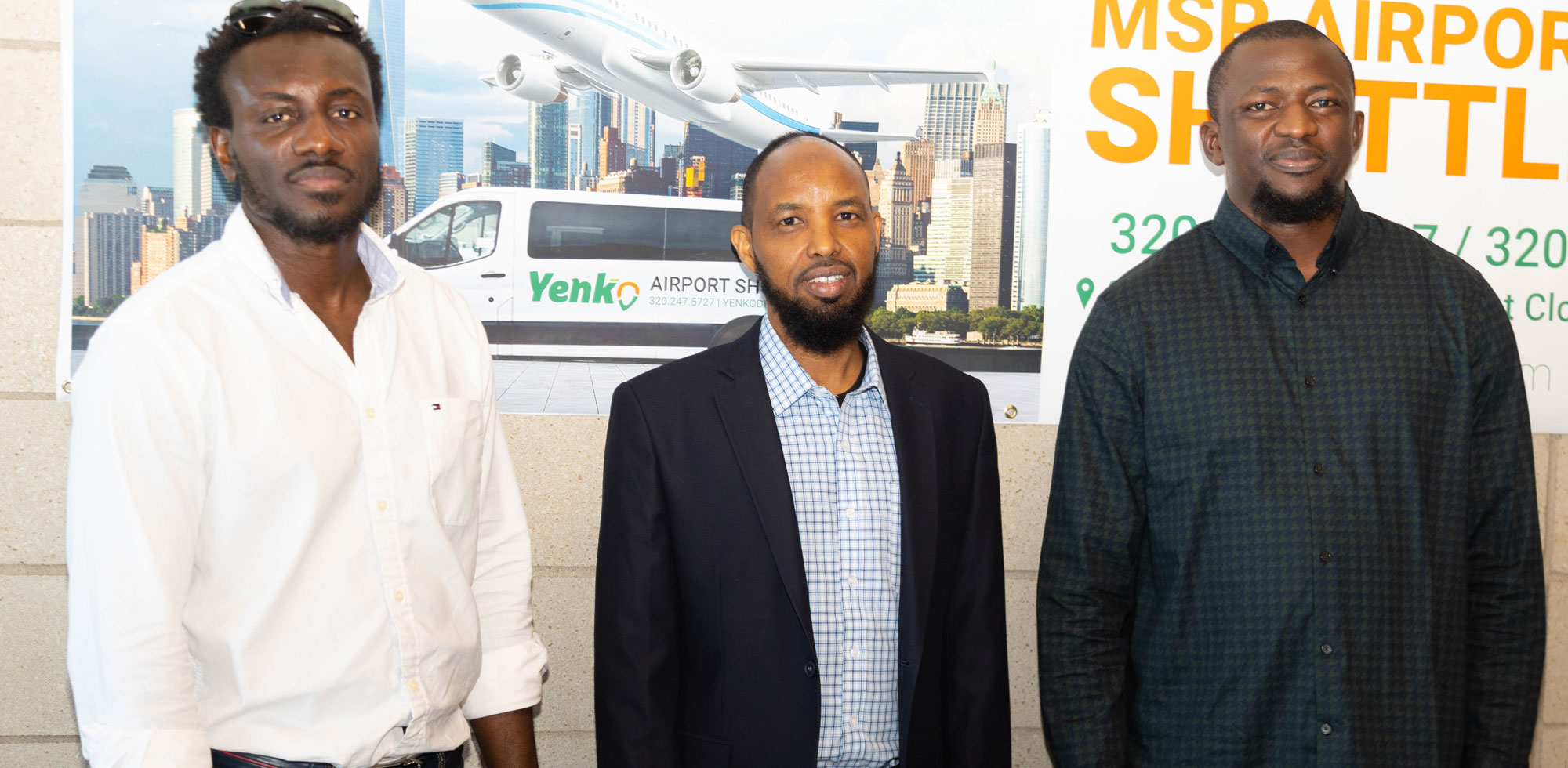
Lifting Up Entrepreneurs
Six recognized for building businesses while meeting local community needs
By Lisa Meyers McClintick | Photography by John Linn and Mohamed Jama
The sound of fast dance beats and cheers for energetic dancers mingled with the aroma of curries and soul food and the warmth of camaraderie during the Initiative Foundation’s Emerging Entrepreneur Showcase and Awards.
The June 25 event at The Clearing in Sauk Rapids featured dozens of entrepreneurs who have graduated from Enterprise Academy, an Initiative Foundation program that assists people from underserved communities and provides wrap-around services as they build their business. The event recognized six stand-out business owners for their achievements.
“These entrepreneurs often find an unserved need within their communities, such as culturally appropriate food and fashion, affordable transportation or creatively nurturing children who don’t have a lot of economic resources,” said Donniel Robinson, entrepreneurship programs manager at the Initiative Foundation. “We support them as they knit together a small business community and lift each other up.”
A variety of experts help Enterprise Academy participants fine-tune a business plan, navigate licensing and bookkeeping and launch a new business or strengthen an existing small business. Participants also build a support network through peers in each cohort and can apply for loans.
Since its launch in 2018, Enterprise Academy has graduated some 250 students, primarily in the Long Prairie (Spanish-language classes), Mille Lacs Tribal Economy (Onamia) and St. Cloud areas. The program has provided more than 6,000 hours of classroom training and 1,700-plus hours of one-on-one coaching.
“More than 60 percent of our graduates have followed through to start a business,” Robinson said. “That’s compared to the national average of 20 to 25 percent for startup entrepreneurs who have received some form of training. We are proud of them and their efforts.”
Here’s a look at the 2024 Emerging Entrepreneur award winners.
Community Impact | Sarah Drake
Keeping up with artist Sarah Drake’s many endeavors can be dizzying, but they all overlap with themes of art, social justice, clean water and helping young people of color succeed both near her home in Sauk Rapids or as far away as the village of Tiébélé in Burkina Faso.
Drake has proven how one person—a single parent with chronic health struggles—can make a big difference with initiative, persistence and creativity.
Her connection to Burkina Faso began with a dream she had about black-and-white geometric patterns in the 2010s. Online research revealed the patterns were folk art specific to the village of Tiébélé. The local women would paint the patterns on mud huts. Drake felt an immediate connection when she was able to visit the village and the women, but she also saw the deep need for clean and safe water sources.
She created her nonprofit, herARTS in Action, to help. Through fundraisers, sales of jewelry, and a trio of children’s books she wrote about a little girl in Burkina Faso and illustrated with paper collage, she’s been able to fund water wells in two different villages. The wells serve about 17,000 people. The books blend lessons in colors, ABCs and numbers with cultural stories from Burkina Faso.
The pandemic and civil unrest have made it difficult for Drake to get back to Burkina Faso, but she continues to collect school supplies, solar lanterns, mosquito nets and other basic items to support about 30 village girls who need to attend school.
Drake, whose biracial daughter is now attending college, often can be found in area schools and neighborhoods, working to make art experiences more equitable. She’ll help students work on Black history and projects for Martin Luther King Jr. Day, introduce them to Black artists, and do summer programs such as painting Black mermaids or a giant octopus around city stormwater drains to remind residents to keep stormwater areas free of debris that can wash into the Mississippi River and other waterways.
She nurtures kids who are quiet or don’t think they have talent and helps them tap their own heritage and identity by finding their voice through art. She also brings empathy for facing obstacles. Her preference for paper collage came from needing a gentle medium as she deals with chronic pain with fibromyalgia, arthritis, spinal stenosis and neural processing issues after an injury.
“Art is such a therapeutic way to heal,” she said. “My work is rooted in social justice and community. My work wouldn’t be needed if everybody in the community was honored and celebrated and had what they needed.”
Go to herartsinaction.org for more information.

Groundbreaker Award | Fatuma Yasin
With displays of elegant abayahs (long loose dresses), silky hijabs with vibrant patterns, stylish shoes, purses and bold sunglasses, Asha’s Beauty brings together clothing and accessories that appeal to women who seek modern, upscale fashion while following the modest expectations of their cultures and religion.
“My biggest accomplishment, especially as a Somali immigrant, is getting into Crossroads Mall,” said Fatuma Yasin, who started Asha’s Beauty with her mother about six years ago.
It hasn’t been an easy road, especially with her mom now living in the Twin Cities and while having three children at home, but she broke new ground as the first Somali-owned boutique in the region’s largest shopping center.
“My customers were always traveling to the Twin Cities for clothing,” Yasin said. Now she has customers from St. Cloud, Willmar, and even the Twin Cities who come to Crossroads to shop at her store for professional and special-occasion clothing or a fresh accessory.
Going through the Enterprise Academy helped her gain business skills to expand her customer base. It also boosted her own confidence as a business owner and helped her to connect with other small business owners in the community.
“Never give up,” she advised anyone else with a business dream. “Keep going and strive for bigger and better.”

Product/Service of the Year | Sahara Gibson
The silky fringes on the Bratz Dance Team’s neon costumes swirl and sway as the young dancers pop their hips, kick, do the splits, somersault and flip to whoops of admiration.
“I was inspired by being a dancer as a child,” said choreographer Sahara Gibson, who wanted to bring the joy of movement to some of St. Cloud’s most underprivileged neighborhoods when she started her Area 56 Dance Studio in 2022.
“We want people from all walks of life,” Gibson said. To keep costs down and involvement accessible, she sews the costumes herself and will often transport kids to and from practice. She skips the heavy makeup often used in dance competitions and has relied on older dancers and the local group Too Much Talent to braid dancers’ hair before a show or competition.
“We work with our own natural beauty,” Gibson said.
She’s seen kids who were shy and knew nothing about dance become someone who thinks about it non-stop and who cannot wait for the next performance or contest. The troupe has already brought home several dance trophies and they dream of adding more in the years to come.
“All of [the dancers] are coming out of their shells,” she said.
Jamya Jackson, 12, dances with the group and enjoys learning new moves and being a role model for younger dancers. “It feels like a big happy family,” Jackson said. “It’s fun, and you get to express all of your emotions on the dance floor.”
For more information, visit the Bratz Dance Team Facebook page.

Food Business of the Year | Hussein Farah
For St. Cloud’s Somali population, a step inside Hussein Farah’s Thirty-Third Meat & Grocery and Horseed Deli at 710 33rd Ave. N. is filled with the scents and sights of comfort: stuffed and crispy deep-fried sambusa, anjero (a lightly fermented griddled bread) used to scoop up chicken or beef suquaar (small pieces of meat sauteed with vegetables), or sweet, spiced tea.
It serves its north St. Cloud neighborhood much like the neighborhood grocers that used to dot St. Cloud before big retailers took over.
The growing number of East African residents, however, didn’t always find what they wanted on chain-store shelves or wanted a store that was comfortable to walk to and to find familiar foods and services.
Farah’s store began about 10 years ago with groceries such as halal meat (which is processed according to religious customs), along with rice, pasta and general dry goods. He also provides money remittance services.
“My business is designed to meet people’s needs,” he said. “I made it convenient for them to shop here.”
Farah graduated from the Enterprise Academy during fall 2018 and, with the support of a culturally compliant Initiative Foundation microloan, was able to add his deli in 2019. The addition of the deli opens up catering opportunities as Farah expands his business—one of a growing number of small ethnic grocers and restaurants in the St. Cloud area.
“The nature of business is not predictable,” Farah said. “Sometimes it is slow and sometimes high, and I’m aiming to be in a better position soon.”

Charles Owusu and Ibrahim Soumare with Ismail Mohamed, Enterprise Academy program officer (middle) during the Emerging Entrepeneur Showcase & Awards event.
New Business of the Year | Charles Owusu and Ibrahim Soumare
When St. Cloud State University professor Ibrahim Soumare needed frequent rides to the Minneapolis-St. Paul International Airport for work, he yearned for a more affordable, convenient option that didn’t involve long waits for a shuttle service.
“I’m pretty sure there are other people who are also frustrated,” he said at the time. “Perhaps we need an additional shuttle in town.”
Soumare partnered with Charles Owusu, who has a master’s degree from the University of the West of Scotland, and had started a thriving facilities maintenance business. Together, they worked on a business plan for a new shuttle service named Yenko, which means “Let’s Go” in the Akan language family of West Africa.
While attending a spring 2023 Enterprise Academy class, Soumare and Owusu created a website, put together pricing, planned pick-up and drop-off locations, and figured out licenses, permits, and insurance.
“As an African immigrant here in the United States, it’s never easy to be an entrepreneur,” Soumare said. “We have a lot of barriers, such as access to information and access to resources.”
With support from an Initiative Foundation microloan, the duo invested in their first van in 2024 and began to offer shuttle rides between St. Cloud and Minneapolis-St. Paul International Airport. They’ve since expanded their service to residents in Alexandria, Little Falls, Monticello and Rogers, with plans to keep growing.
“The expert resources [with the Enterprise Academy] provided us with mentorship and guidance that really helped us in our journey to where we’re at today,” said Owusu.
More information can be found at yenkodrives.com.
A Growing Suite of Business Supports
Small business support at the Initiative Foundation goes beyond just providing capital. We also offer a range of services, including entrepreneurial programming through our Enterprise Academy and Initiators Fellowship programs, and an array of supplemental training opportunities. Support can come in many forms, from crafting a business plan to basic bookkeeping or marketing guidance.
COACHING & SUPPORT
The Foundation and local experts provide one-on-one guidance on a variety of topics: financial planning and compliance; business structures and contracts; leasing and buying land and buildings; marketing and sales; and legal compliance.
TRAINING, WORKSHOPS
Initiative Foundation business training and workshops are shaped by local feedback. From building basic business credit to bookkeeping and marketing, the Foundation enlists experts in their fields to offer free or small-fee workshops.
FREE ON-DEMAND, ONLINE TRAINING
The Initiative Foundation offers a free online platform with ample resources to help entrepreneurs grow their businesses. Called Initiate Prosperity, this self-paced learning platform provides around-the-clock access to calculators, templates, video tutorials and guides in English and Spanish where entrepreneurs can polish their marketing skills, learn management strategies, or zero in on cash-flow strategies.
INITIATORS FELLOWSHIP
The Initiators Fellowship is Greater Minnesota’s premier fellowship for emerging and aspiring social entrepreneurs. The two-year program helps social entrepreneurs build their business and leadership capacity and provides wrap-around training, mentoring and guidance—plus $30,000 annually for two years—to support Fellows and their social enterprise ideas. It serves four Minnesota Initiative Foundation regions—Initiative Foundation, Northwest Minnesota Foundation, Southwest Initiative Foundation and West Central Initiative—with a goal of expanding to all 80 Greater Minnesota counties. The Initiators Fellowship will begin recruiting for 2026-2027 Fellows during spring 2025. Visit fellows.greaterminnesota.net for details.
ENTERPRISE ACADEMY
Enterprise Academy is the single-largest early-stage entrepreneur training program in Central Minnesota. At the heart of the program is a 12-week business course that provides training and individualized advising to help underserved entrepreneurs start and grow small businesses. The expertly taught classes lead students through basic business principles and helps them start—and ultimately finish—a business plan. Graduates receive ongoing technical support and can also apply for market-rate microloans through the Initiative Foundation. A youth Enterprise Academy also is being piloted in the St. Cloud area to inspire young entrepreneurs. Learn more.
Why We’re a CDFI
Community Development Financial Institutions (CDFIs) like the Initiative Foundation are specialized entities that provide financial services to underserved communities. When lenders operate as CDFIs certified by the U.S. Department of Treasury, they serve their communities in several impactful ways:
Small Business Support: CDFIs provide loans and other financial products to small businesses, especially those in low-income areas. Lending initiatives help businesses in overlooked communities manage cash flow, expand operations, and sustain employment.
Job Creation and Retention: By supporting local projects, CDFI lenders contribute to job creation and retention—a particularly important role in areas with limited economic opportunities and high unemployment.
Economic Inclusion: CDFIs prioritize lending to underserved and overlooked entrepreneurs to advance inclusion and to empower those who have operated in the margins.
Flexible and Patient Capital: CDFIs take higher risks and offer more lenient terms, making them a critical resource for projects that might otherwise not secure financing.
Forms of Capital
While low-interest, flexible loans are a critical tool in the CDFI toolbox, CDFIs provide a broad range of investments across different forms of capital to support small businesses, economic growth, and community development. Forms of capital include:
Financial: Delivering loans, investments, grants and other dollars to businesses that otherwise struggle to access financial products.
Knowledge: Classroom learning through workshops and cohort programs that provides core education on starting and running a businesses.
Skill: One-on-one and group coaching and training to develop hands-on skills and learning for specific business types.
Social: Connections and access to networks and relationships that provide critical resources at the right time.
Cultural: Identifying and utilizing culturally specific practices as unique assets for success.
Advocacy: Championing policies, securing funding, and navigating regulations on behalf of entrepreneurs and communities.
